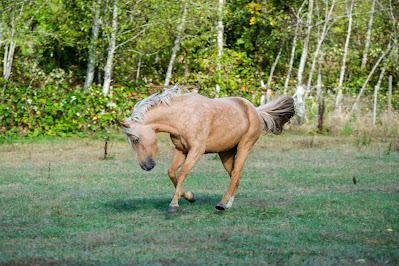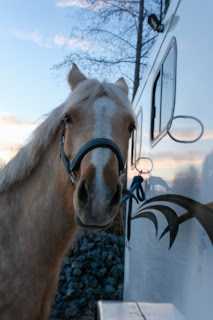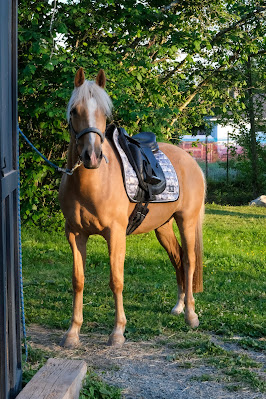I've been pondering this one for a few years now, probably since the arrival of Sophie.
She's guilty of the mare face now and then. She's very much one to tell you in no uncertain terms if she likes or dislikes something.
Let's use tack as an example. There's a specific girth she hated...like she would pin her ears and show her teeth at it if she saw it. There's one she didn't mind wearing, but once we got going, the buckle placement she found to be persistently annoying (displayed by her bending around to nose or scratch at it whenever we took a break). The ones she likes get no reaction (although she does like to have a sniff/look first to make sure it's one of the 'chosen ones' lol)
She's fussy, but I don't find her overly complicated to be around. She wants you to be happy with her, she is kind to be with, but also she has feelings about many things if you're willing to listen. My one critique would be she can get worked up to the point she's not as respectful of your personal space on the ground as she should be, but we check in on that regularly and her brain comes back very quickly with a correction or two these days. So, the old school trainers might argue she doesn't respect me as leader 100% of the time.
 |
| Watch out, mean pony incoming ;) |
So, the question.
I've had feedback here and there to 'get after her when she makes that face'. Normally though it's the dog she doesn't like, the inanimate object she associates with being uncomfortable. So, I tend to not mind, it's not directed at me, not a safety issue and it doesn't escalate. She's also my equine goldfish so the nasty mare face can also cycle through interested/happy/bored/tired/looking for snacks etc in 60 seconds lol. After B being so 'meh' about the world it's kind of refreshing to have a pony who's a completely open book.
 |
| Because she's also normally the happiest happy pony ever. There's not a lot of middle ground with this one. |
Alternately, clicker training has been suggested. The idea being she is rewarded for having ears forward and making a pleasant face when otherwise she might be tempted to do the mare glare.
I have no doubt I could teach her to put her ears forward all day long for treats and 'good girls'. I'm more doubtful that would happen by 'getting after her' lol. But I kind of feel like we have a decent feedback loop going here and if that means sometimes she looks miserable then that's my cue to listen/try harder/do it differently.
 |
| hate that girth, no thank you |
How do you handle your mare-y mares with feelings? Am I being too generous?


This is interesting to me because Carmen is exactly the same. I have decided to ignore her face and let her express herself unless she's being sassy 'at' me. For example, she does not like her midline belly being groomed. She never has and will make the most awful faces. I tell her that I have to and just ignore it. She will pin her ears when I tighten the girth (but only when I tighten in the barn, not anywhere else. Mares!). I ignore any ears but if she snakes her neck or gets more cranky I keep the pressure the same until she softens. Who am I to tell her she can't have feelings. That could lead to a shut down horse.
ReplyDeleteI really believe that there's a difference between a horse being aggressive/dominant at the handler and just expressing their feelings. One needs correcting, the other does not IMHO.
I was hoping you'd chime in because I feel like Carmen and S might be similar in a lot of ways. There was an 'incident' a few months ago where she turned to me when I was grooming under her front legs (hates it!) and her nose made contact with my upper arm when I turned into her. She was so horrified she jumped back, broke the tie ring, and stood shaking. It was all quite the drama, but I think we can safely say she understands I draw the line at making faces only. I thought about posting about it but thought you might be one of the few who gets what life can be like with so many feelings ;)
DeleteI would definitely just take it as a form of communication! I draw a very hard line at turning the face into any form of lashing out at the human - kicking or biting is grounds for a serious discussion about their current choices. But until that point, I try to listen to what they're saying (and still do consider what led to the kick or bite, but make it understood they are never allowed that expression).
ReplyDeleteThe closest I have that we did try to turn around was Yoshi's stall guarding. He would make mean faces the second you entered the stall and that we tried to turn into positive feelings with treats and praise for neutral or kind faces. But that I think was held over from being on the track and feeling the need to guard his space.
I never worried about the faces because they're always just that and not directed to me, but then I've had a few people offer 'fixes' for it in the last year and I was wondering if maybe I was being oblivious to a problem. I can see training the stall guarding thing, that feels defensive and like you say based on a past experience rather than anything he needs to worry about today.
Deleteyea i'm all for the communication side of things, the 'feedback look' you describe --- i honestly really like it when my horses tell me how they feel, and i'll admit i allow a higher degree of horse-initiated touching maybe than some would... but it works for us (***and the staff tasked with also handling the animal, an important aside that is maybe less important in your situation!), and that's legit all that matters. and yea lol, charles has very specific girth preferences and... fine fine, we can accommodate that too!
DeleteUgh I have such strong feelings on this, mainly from the dog world. As long as the angry face is not in tandem with dangerous behavior, I will never EVER encourage an animal to reduce their "warning signs", because those warning signs, if you're willing to pay attention to them (and I know you are) often PRECEDE dangerous behavior. I bet those same people that suggested "getting after her" probably also discipline their dogs for growling at other dogs and then act so surprised when Fluffy snapped "with no warning." No kidding, you told them their natural early warning system was a bad thing that needed to be neutralized. What other options does she have to tell you she hates that girth? You're just asking for a horse to either grin and bear it, or to explode on you someday. Let her make her faces as long as the rest of her is polite about it (no getting in your space, threatening you, acting out, kicking/biting, etc). And if that happens your discipline needs to be timely, so that she knows exactly what you got after her about (bad behavior) and what you didn't (communicating her likes/dislikes).
ReplyDeleteYou've summed up the partially formed thoughts I had perfectly. I was fine with it as long as she kept it to respectfully having a conversation with me. But then a few different people in the last short while have made (unasked for) suggestions and I started second guessing myself. I like how you've related it to dogs - 100% I can see her learning to hide it then exploding 'with no warning'. It's a stereotype for sure but the 'get after her advice' came from a couple of western trainers who maybe work with more than their fair share of breeds that would probably just shut down. The clicker training advice came from someone I normally find quite tuned in to equine behavioural science so it got me really wondering if I was oblivious to a problem...but also it felt like the equivalent of teaching my horses to lie. Thanks for being a most excellent sounding board!
DeleteI think it's really important to distinguish that the clicker/R+ training should not be used to mask a behavior or ask a horse to grin and bear it. And also, as Jen said, that getting after her for mare face will result in EXACTLY that outcome if you use it as directed here. (Mare face = punishment --> reduction in mare face.)
DeleteThe clicker training I would use would be too get Sophie happier with the idea of the girth. Say right now - and I'm getting hypothetical here - it's a very minor discomfort because it's a girth, but other than that causes no pain. So she's just slightly "ugh" toward it. The very quick synopsis is that by pairing the girth with positive reward, you can turn "slightly ugh" into "ooooh girth??" Which would eliminate the negative feeling behind it. Same as how I turned Speedy from "backing over a pole is terrifying because what if I trip" to "so how many poles can I back over for more cookies, my tiny vending machine?"
Thank you for the reply! That makes so much sense. I admittedly put about zero thought into 'head down for short human to bridle you and bit into mouth = cookies after' to keep it fun. It would make perfect sense to extend to other things. Not trying to mask any behaviour, just putting a positive association in place so it really is happy interested ears to see her girth
Delete100% what Jen said. Exactly.
ReplyDeleteYou're right on target, in my opinion. She's communicating. Maybe in a slightly more sassy manner than most people like, but she's just talking. You may as well ground a teenager for having an attitude or give them chocolate for smiling - you'd get behaviour modification, but nothing deeper than that. The alternative is to actually listen to what's going on in their heads, which is what you're doing. Kudos!
ReplyDeleteThe more I learn with my current trainer, the more I understand how much "old school" horse people are just notorious for not listening to their horses. At all. Her horses are encouraged and rewarded for what a lot of old school people would see as disobedience. For example, if I am cantering along, and my horse breaks gait, there is a 99.9% chance that I tipped forward or leaned to the inside and her breaking gait was her way of catching me so she doesn't lose me. That "disobedience" is rewarded because it was a RIDER ERROR and how else am I going to ever be aware of what the heck my body is doing, unless the creature who is carting me around can say, in their language, hey, you're off-balance, let me help you. So, as I continue to learn on this journey, I'm becoming a bigger and bigger supporter of listening to them and their feelings all the time -- as everyone else said, as long as it is not escalating, dangerous to the humans, etc. And the Jen's point, this is also evolving how I handle, work with, and live with my puppy.
ReplyDelete